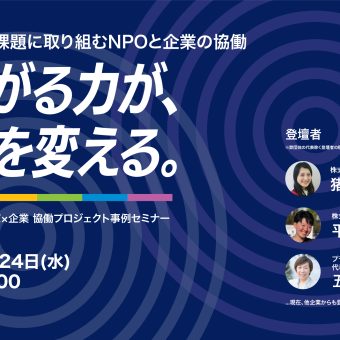News / Report
A Seminar on “Fair and Equitable Eligibility Criteria for ALL Athletes”

On Friday, November 4th, Pride House Tokyo co-hosted a study session on “Fair and Equitable Eligibility Criteria for ALL Athletes,” which was attended by more than 100 athletes and sports professionals.
At the Tokyo Olympics – which took place last year, Laurel Hubbard of New Zealand made history by becoming the first openly trans woman to compete in the Olympic Games. Additionally last November, the International Olympic Committee (IOC) announced a “Framework on Fairness, Inclusion and Non-discrimination on the basis of gender identity and sex variations.”
-640x454.png)
The IOC Framework suggested that the criteria for categories in which transgender athletes, athletes with hyperandrogenism, and female athletes can compete will be based on scientific evidence and without infringing on human rights, and rules will be established by each athletic organization based on the characteristics of each sport.
Following the success of Lia Thomas, a transgender woman competing in the National Collegiate Athletic Association (NCAA), the International Swimming Federation (FINA) announced a new policy this June: FINA’s policy restricts transgender athletes from competing in the women’s category and requires them to prove that they have not experienced male puberty at all to qualify for the women’s category. FINA also decided to establish a working group to consider an “open category,” in which transgender athletes could compete.
The study group invited Ms. Joanna Harper, a transgender athlete researcher at Loughborough University in the UK, to explain her research from a medical science perspective. Ms. Kyoko Raita, President of the Japan Society of Sport and Gender Studies and a professor of Chukyo University School of Sport Sciences, who is familiar with the discussion on “sport and gender,” Fumino Sugiyama, a former Japanese fencing champion alongside Shuna Matsumoto, a former track and field athlete and current athletic performance coach, were invited as panelists.
In addition, Ms. Tomoko Wada, Chairperson of the World Triathlon Women’s Committee and Executive Director of the Japan Triathlon Union, shared information on the discussions at the International Triathlon Federation.
Keynote by Ms. Joanna Harper
Ms. Harper opened her presentation by saying, “While the transgender population is estimated to be between 0.5 and 1.3%, the trans athlete population is even smaller. More than 5,000 female athletes competed in the Tokyo Olympics, but this was the first time an openly trans woman competed, along with two other athletes who are openly non-binary. Trans women have some physical advantages, but socially they are at a huge disadvantage.”
She then introduced the following various studies
● A study of the effects of hormonal changes on body composition, muscle strength, and hemoglobin in hormone-treated trans women found that 36 months after the start of hormone treatment, muscle strength had declined, but had not reached female levels (Harper, et al, 2021). The same study reported that hemoglobin levels fell from typical male values to typical female values within four months of hormone therapy initialization.
● Two studies reported a 57%-62% difference in grip strength between cis men and cis women, compared to a 17%-19% difference between post-hormone therapy transgender and cisgender women (Hilton, Lundberg, Alvares, et al).
● One study reported that VO2 max (maximum oxygen uptake) in post-hormone therapy trans women and cis women were nearly identical when calculated in proportion to body size (Alvares).
● A study measuring 1.5-mile runs showed that trans women gradually lost speed after the start of hormone treatment, but still maintained faster speeds than cis women after more than two years, and that trans men became faster and faster after hormone treatment and matched the average cis man after two years. In a push-up test, two years after the start of hormone treatment, trans women’s numbers were not significantly different from cis women’s, while trans men’s numbers matched the cis men’s average. The sit-up performance of trans women also declined to equivalence with cis women after 2 years of hormone therapy while trans men exceeded cis men after 2 years. (Roberts et al. 2020).
● In a study of pre- and post-gender affirming hormone therapy where data were collected from 15 trans athletes (one trans man and 14 trans women), testosterone levels in trans women dropped to female-like levels within one year of starting hormone therapy.
● Data were presented from a longitudinal case study on a transgender cyclist detailing pre- and post-hormone therapy changes in physical performance, including grip strength, bench press, maximal oxygen uptake, and cycling power.
Ms. Harper stated that, at present, the data are very limited, and each athletic organization must make the best decisions based on the data it has, but she concluded that:
● The decisions and documents that are made now should be able to be modified based on the results of future research.
● Currently there should be no restrictions on trans women’s participation in recreational level sports
● It is appropriate to limit participation at the elite level based on testosterone levels.
Ms. Kyoko Raita of Chukyo University explained the historical perspective of “the history of the sports world regarding fair and equitable categorization.”
-640x454.png)
Prof. Raita started off by saying, “the international community moves from a medical model to a human rights model, sports are seen as if they exist as a backlash or reaction to that model.”
After introducing the IOC framework at the beginning of her presentation, Mr. Raita stated that “the focus should be on education and awareness-raising to eliminate discrimination against exclusion in all sports settings, and that it would not be necessary to apply the elite sports provisions to general recreational sports settings and school sports.”
Ms. Tomoko Wada, World Triathlon Women’s Committee Chairperson
‘Beginning in 2019, as World Triathlon saw momentum building around the world for the creation of standards for inclusion of athletes with chronically higher testosterone levels and transgender athletes in the Olympics, the Medical Affairs Committee Chair led a study of literature research, discussions with other IFs, and the IOC Medical Affairs meetings. Since 2021, the Women’s Committee, the EDI (Equity, Diversity, and Inclusion) Committee, the Athletes’ Committee, and the Coaches’ Committee also participated and continued discussions.
In March 2022, a specific proposal was submitted by the above committee at the request of the Board of Directors, but the decision was not taken by the Board of Directors due to the need for further information and research, and in July, representatives of the relevant committees, including the Legal Covenant Committee within the Federation, again met for a three-day in-depth meeting with experts in the fields of medical science, human rights, and The Board had the opportunity to hear from non-binary and transgender persons. As a result, the committees submitted their recommendations again, and the board discussed them. In August 2022, a policy was adopted to approve the participation of transgender women in the women’s category if they meet the requirements of the following:
● Testosterone level within 2.5 nmol/L
● At least 2 years since suppression of testosterone levels
● At least 4 years since participation in competition as a male
In the face of conflicting arguments amongst sports scientists, the Board of Directors has decided on a transgender policy for triathlon as a sport, based on the latest available data and the proposal of the TRI Medical Affairs and Anti-Doping Committee. The recent IOC framework shifted the onus to individual federations and World Triathlon has followed the IOC lead. To exclude transgender athletes at this stage would mean that research specific to this sport itself would not be possible, and we cannot hope to go beyond that. We came to the decision that we should first make legal arrangements in the direction of accepting transgender athletes, so that fairness can be maintained in the process. The policy that has been decided upon is a ‘living document’ that will be revised and updated based on the latest scientific research on the matter.”
Panel Discussion
Mr. Fumino Sugiyama
“I was reminded that it is important to think from an evidence base, and not an emotional one.
I played fencing from the age of 10 up until 25, but at that time there was no discussion of transgender athletes, and I retired as if I was running away, not feeling that I had a place where I could be myself. If I wanted to be myself, I would not have a life as an athlete, and if I wanted to continue competing, I would not be able to be myself, and I had never thought about balancing the two things of “being myself” and “competing.” I am very happy that the possibility of this is now an option.
While much attention has been paid to transgender people, there are many inequalities in the world of sports. I believe that this category should be considered on the same level as other forms of “fairness,” such as athletes from rich and poor countries competing together, 2-meter athletes and 160-centimeter athletes playing basketball together, the difference between athletes with and without disabilities, and so on. I think this is a category that should be considered at the same level as various other forms of “fairness.”
If trans women’s participation in competition is unfair, shouldn’t there also be more understanding of how trans women are forced to deal with various social injustices and are victimized by the society?
It is often said that sports and social issues should not be combined, but I believe that sports and society cannot be separated. Exclusion from sports leads to exclusion from society. The base should be inclusion, to further consider fairness.
If we are going to talk about true fairness, we should consider this in trans men as well, although trans women tend to be the focus of attention. I think that true fairness cannot be discussed unless fairness is also discussed in terms of both the possibility of an advantage and the possibility of a disadvantage.
There are pros and cons, but I think it is very important that in the process of the discussions, understanding will grow. It is precise because transgender athletes competed in the Tokyo 2020 Games that this kind of discussion is now taking place in Japan, and people who had never thought about transgender athletes before are now starting to discuss it, as they are doing today. It is as if Japan has finally entered the ring of discussion. Society will change if the sports world changes. I hope that the continuation of this discussion will further deepen our understanding. So, thank you for your continued support.”
Ms. Shuna Matsumoto
“I was a track and field athlete. Athletics has different rules, distances and weights for men and women. Personally, I didn’t really want to deal with the different rules when changing from men’s to women’s competition.
On the other hand, I was surprised to hear for the first time the other day that in Japan, physical education classes are divided into separate classes for men and women. When I was growing up in Germany, it was the norm for boys and girls to do PE together, and I grew up in an environment where we did not separate them by gender. I think it is better if the categories are divided by level and not just by gender.
I think there is a great deal of growth that can be achieved through sports, so I don’t like the idea of excluding transgender people from that. Apart from the high level, I think it is dangerous to exclude them at the level during their development such as the junior and kids’ level. I want people to value growth, hard work and others through sports. So, to be able to have such discussions, I think society needs to be more gender equal. I think we also need to have more discussions about whether society can change from sports, or whether sports can change from society.”
Ms. Joanna Harper, openly trans woman
I was an active marathon runner and recorded a personal time of 2 hours 23 minutes. Nine months after starting hormone therapy, my times got slower by 12%. This is the same as the average difference between men and women. I lost my physical advantage as a male distance runner and felt it was fair for me to compete in the women’s category.
But if I beat a female athlete, that runner thinks it is unfair. If she beats me, then she thinks the race is fair.
This put me in a very difficult position. I have definitely experienced a lot of negative attitudes from other ahtletes.”
I recognize that it is impossible to create rules for transgender athletes that result in 100% inclusion and 100% fairness. We must make choices in the process. But if you value inclusion at the recreational and junior levels and place some limits on elite trans athletes, I think that you have about 90% inclusion and 90% fairness. Hence, I think we should try to come up with policies that allow us to strive for maximum of both inclusion and fairness acknowledging that some compromise is required.”
Ms. Kyoko Raita
The debate over fairness, inclusion, and the categorization of sports is not a universal one, as it has been changing rapidly with time and values. Learning about the changes, it makes me think that the gender division into men’s and women’s sports is itself outdated in the first place, and that sports will enter a new phase in the 21st century. It is necessary to change the paradigm in line with the current trend, rather than maintaining fairness from within the current way of thinking. We need to think flexibly about how to make the sport interesting to various people and make it something they would like to try.”
I thought it was very noteworthy that the evidence from Loughborough University research showed that even if we talk about gender affirming hormone therapy, it has different effects on different people, and that it has different effects on different parts and functions within a person’s body. We need to gather more evidence in the future. Only with this kind of research will we be able to talk about participation standards. We should not make judgments that exclude transgender athletes based on a simple view like performance up downs, but to look at things from multiple perspectives.
Joanna also told us that it is difficult to accumulate such evidence in the absence of an inclusive environment, with discrimination and exclusion, which is difficult even in the UK, where the Equality Act was passed in 2010. I thought that the first prerequisite is for the sports community to implement education and raise awareness to eliminate discrimination and exclusion and to create an environment where transgender and cisgender people can work together to accumulate scientific data and engage in dialogue.
Listening to you everyone today, I was reminded of the International Fair Play Commission’s definition of fairness. The Commission defines fairness as ‘equal opportunity to participate in sports.’ Given this, the essential meaning of equal conditions for sport is that fairness is the standard that brings about respect for individual dignity or character. That may not be what we have been thinking of as fairness – fairness for those who have been able to participate without much difficulty. We need to keep that in mind and think about it. In considering how the sports world should be, where many transgender athletes as possible can compete together and data can be accumulated in the process, I was reassured here that we must create an inclusive environment, or we will not be able to move forward. This is especially true in the case of the Japanese sports world, which does not have equality or anti-discrimination by law.”
Affiliated organizations
Organized by: Pride House Tokyo、 (NGO) SDGs in SPORTS
Supported by: Women Sport International, Japan Olympic Committee
Operated by:Pride House Tokyo Athletes’ Messages Team(Planned and Operated by: S.C.P. Japan)
Funded by: Nippon Foundation
※This report is an English translation of a Japanese report created by SDGs in Sports (partially modified).
https://sports-sdgs.org/webinars/z8a8knby5lpxhkksaawbz9y6ykmg3x
関連
ニュース/
レポート
-
お知らせ

【お知らせ】【9月24日(水)】LGBTQ+の課題に取り組むNPOと企業の協働 つながる力が、社会を変える。 〜 プライドハウス東京×企業協働プロジェクト事例セミナー 〜
LGBTQ+の課題に取り組むNPOと企業の協働 つながる力が、社会を変える。 〜 プライドハウス東京×企業協働プロジェクト事例セミナー 〜 プライドハウス東京は、多様なステークホルダー...
-
お知らせ

経営体制の変更に関するお知らせ
平素よりNPO法人プライドハウス東京の活動にご協力いただき誠にありがとうございます。 2025年3月31日をもちまして、2年間の共同代表理事の任期が終了しました。2025年4月1日からは五十嵐ゆり...
-
お知らせ

2025年度・プライドハウス東京 協賛プログラム説明会のご案内
2025年度・プライドハウス東京 協賛プログラムについて プライドハウス東京は、多様なステークホルダーの皆さまのそれぞれの強みを活かし、セクターを越えた連携でコレクティブインパクトを生み出しながら...

